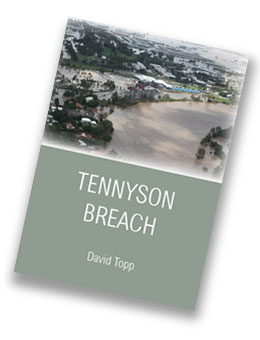FEATURE ARTICLE -
Book Reviews, Issue 64: Sept 2013
It is notoriously difficult to make sterile legal topics the subject of an interesting story, but that is the task that David Topp has taken on with his volume “Tennyson Breach“.
He does so in an interesting amalgam of academic analysis and colloquial discussion, weaving in personal memoir, local history and social commentary with detailed case and legislative analysis.
The author brings his experience as a property lawyer as well as his personal knowledge of some of the history of the area and his experiences as a local resident together to provide a very readable volume tracing the history of the Tennyson Reach apartment complex, the 2011 floods and the litigation that ensued.
The book includes photographs taken by the author himself of the area.
The central focus of the book is the Tennyson Reach apartment complex. But the book spreads its wings further to encompass an examination of planning controls and issues more generally.
The book traces something of the recent history of the area and the site of the apartment complex itself, formerly occupied by the Tennyson Power Station.
The author analyses provisions of the relevant legislative framework and explains, in straightforward terms, the relevant legal concepts — pre-purchase representations, the legislative framework for buying “off the plan” in Queensland.
The book details all of the significant litigation between purchasers of units in the complex and its developer, Mirvac.
The examination of the authorities culminates in a detailed review of the decision in Dunworth v Mirvac [2011] QCA 200 and a discussion about the impact of that decision on the interpretation of section 64 of the Property Law Act 1974.
Mrs Dunworth had contracted in June 2007 to buy “off the plan” one of the units on the ground floor of one of the blocks in stage one of the complex. She alleged that representations had been made to her about the height of the balcony above ground level, about whether some natural bushland nearby would remain and some other things.
Mrs Dunworth successfully applied for an interlocutory injunction restraining Mirvac from terminating the contract prior to trial.
In a judgment delivered on 29 July 2010 following trial, Justice Margaret Wilson did not accept the Dunworths’ evidence that the representations complained of had been made to them. Her Honour dismissed Mrs Dunworth’s claim and ordered specific performance of the contract on Mirvac’s counterclaim. There was also a challenge at trial to the validity of the Community Management Scheme pursuant to which titles for the units had been created. That challenge also failed. Costs orders were made on 10 December 2010 and, it appears, it was then ordered that the contract be specifically performed by a completion date of 8 February 2011.
On 13 January 2011, the Brisbane River flooded and the apartment was inundated. Mirvac offered to repair the apartment and said that it needed four months to do so. However, that offer was rejected and on 28 January 2011, Mrs Dunworth purported to rescind in reliance upon section 64 of the Property Law Act 1974, which provides a right to rescind where a dwelling house is so destroyed or damaged “before the date of completion or possession” as to be unfit for occupation.
Mrs Dunworth applied for orders allowing her to rescind the contract. Mirvac cross-applied for an extension of the time for completion pursuant to the order for specific performance. Justice Margaret Wilson extended the time to 8 June 2011 and ordered that there be a trial on an expedited basis. That extension of time was without prejudice to Mrs Dunworth’s right to assert that she had validly terminated.
Mrs Dunworth appealed from that order. The appeal was allowed by the Court of Appeal, primarily on the ground that on its proper construction, section 64 referred to the actual date of completion rather than that which had been appointed under the contract.
Since publication, the Dunworth matter went to the High Court on Mirvac’s application for special leave to appeal Senior Counsel for Mirvac articulated the special leave point in this way:
“ Should remedial provision of the statute…that modifies private contractual relations be interpreted to enable a…party in breach of…contract, to take advantage of the statutory remedy when the remedy would not have been available had they not breached the contract?”
However, both the Court of Appeal and, it appears, the High Court judges on the special leave application, treated the real issue as being one of the construction of the term “the date of completion or possession”.
Save for the special leave application, heard after publication, the author deals comprehensively with these issues and provides useful commentary on the principles at play.
The author also considers the effect of other natural disasters and proposes reform of section 64 of the Property Law Act to avoid potential loopholes. He argues that the planning controls adopted by the Brisbane City Council and pursuant to which the Tennyson Ridge complex was approved, were flawed.
The book is a very readable and topical contribution from a practitioner plainly very familiar with not only the legal principles that emerge from this particular development but also the historical and, it may be said, some of the political issues as well.
Adrian Duffy



